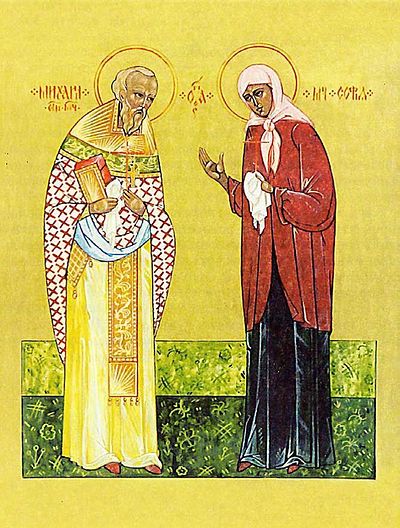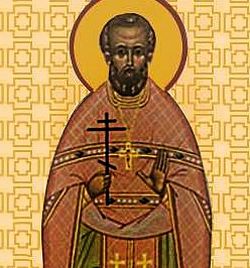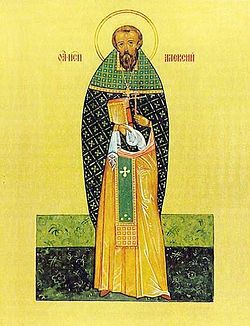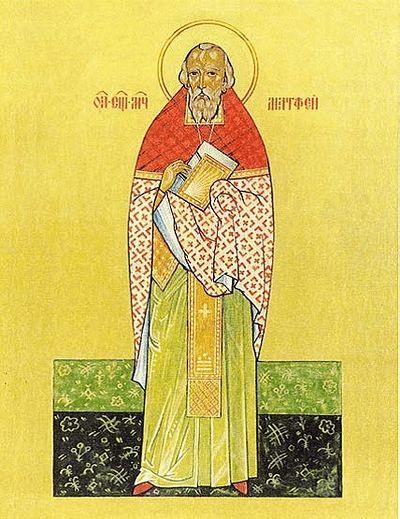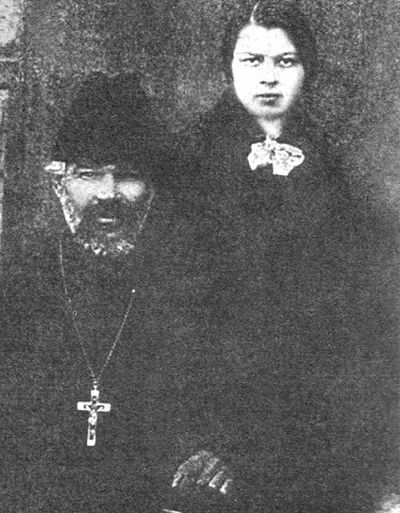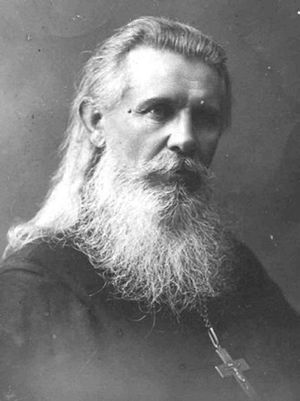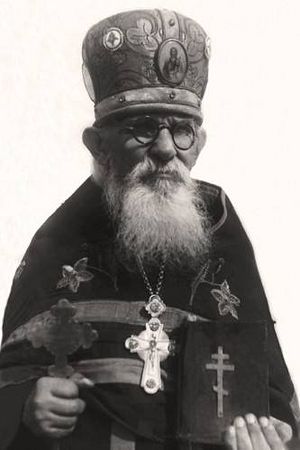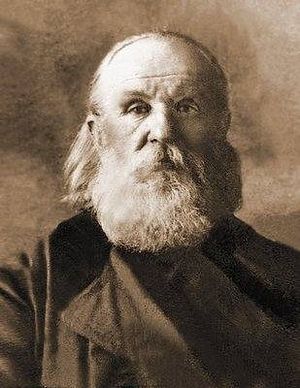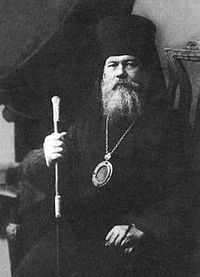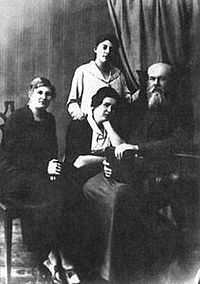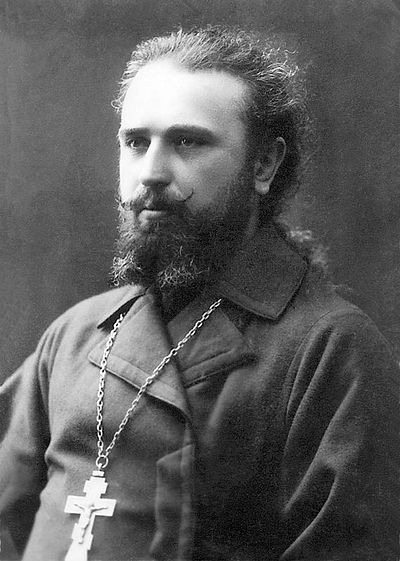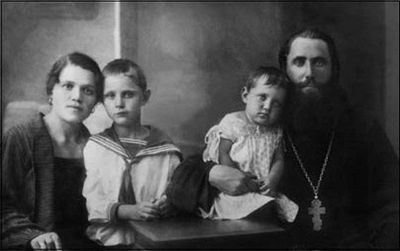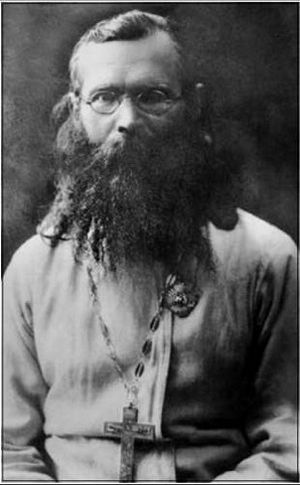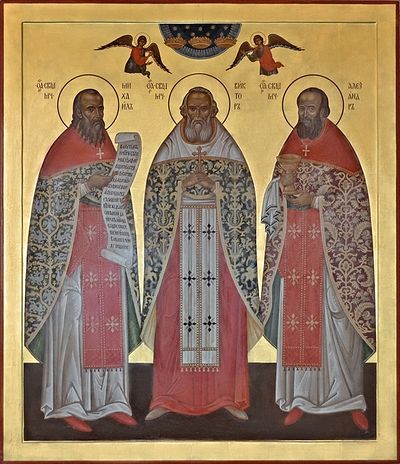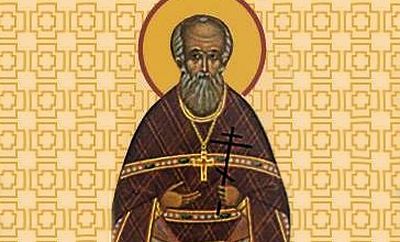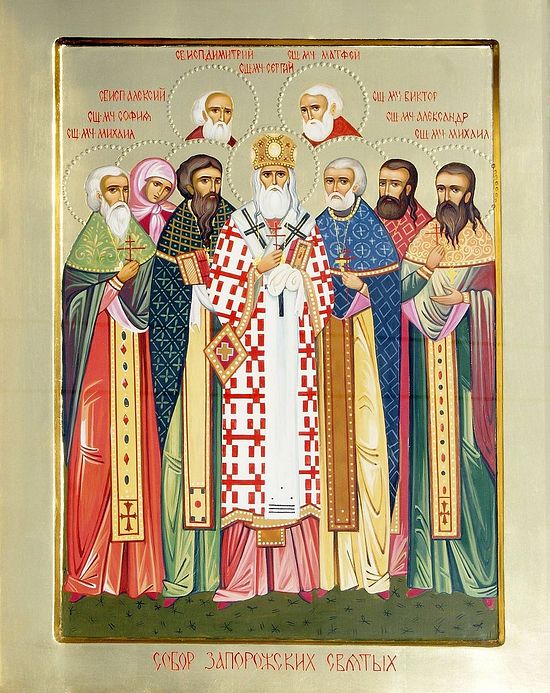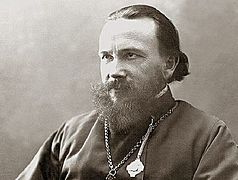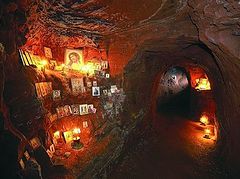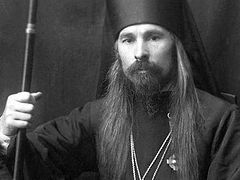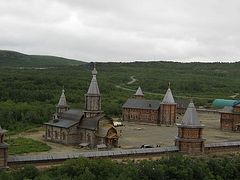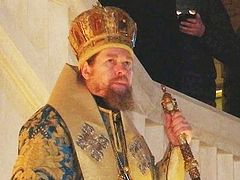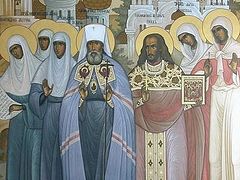Translators Note: Zaporozhye is a region of Southern Ukraine, which means literally “beyond the rapids”1 of the Dnieper River. The trade route of the Varangians to the Byzantines passed through this river—the same route that would introduce Orthodoxy to the Rus’ Lands in 988. Zaporozhye was later the birthplace of Cossacks, and a land associated with the bravery of those glorious Orthodox knights of the free and wild steppes. His Eminence, Metropolitan Luke of Zaporozhye has before called upon the people to remember, and not betray the legacy of the Cossacks2, as defenders of Orthodoxy in times of schism.
This story describes the lives and podvig of the martyrs and confessors of Zaporozhye; these are the true heroes, and their example inspires the faithful in these troubling times.
 The Synaxis of the Holy New Martyrs and Confessors of Zaporozhye. The icon also includes the Holy Confessor Petro Kalnyshevsky, a Zaporozhian Cossack leader who fell asleep in exile as a monk of Solovki monastery centuries before communism. In this sense, Saint Petro is technically not a “new” confessor, but he was canonized recently. Photo: hramzp.ua.
The Synaxis of the Holy New Martyrs and Confessors of Zaporozhye. The icon also includes the Holy Confessor Petro Kalnyshevsky, a Zaporozhian Cossack leader who fell asleep in exile as a monk of Solovki monastery centuries before communism. In this sense, Saint Petro is technically not a “new” confessor, but he was canonized recently. Photo: hramzp.ua. November 1/14 is the day we commemorate the New Martyrs and Confessors of Zaporozhye.
These people lived simply in their time, just as we live now, but trouble came to their house. None of them were excited for it, or encouraging it, but they also did not run away and hide from it. They accepted it just as those who believe in God should do. They simply and humbly, without any “martyr complex,” remained faithful to God.
Father Mikhail Chekhranov together with Matushka Sophia continued to serve God in the village of Vodyane of the Zaporozhye oblast after the [Bolshevik] coup of 1917.
Indeed, the local revolutionary criminals began to chase and slander them, to oppress, threaten and insult them, and to look find some fault with them but they just prayed in gentle silence, and gave thanks to God for everything.
On the day of January 6, 1918, they came for them. Batushka [Father] was taken away, and Matushka went with him voluntarily saying “Wherever Batushka Mikhail goes, I will be there too!” Four children were left behind at home.3 Batushka and Matushka prayed in farewell before an icy chasm [a hole in the frozen Konka River—Trans], in which they were cast, and thereby passed into eternal life, to the praise of God at last.
It was difficult to believe how long this madness might last. It was nothing more than senseless genocide against one’s own people in the name of “the people’s power”.
There was a glimmer of hope that this mindless madness would end, that the people would return to reason, and the satanists, whose power rests exclusively on fear and coercion, would go on their way home—to hell.
Father Alexander Shishin comforted his parishioners with this. His entire “case” only required nine carelessly written pages, as the majority of the Bolsheviks did not require any more than that to kill an innocent man. Yes, no one was going to stand on ceremony with these “counter-revolutionary agitators” (as the Bolsheviks then called the clergy who were loyal to Patriarch Tikhon). Father Alexander “Lepetikhsky” (Shishin) is also commemorated among the Synaxis of Kherson4 Saints on the 13th of October (new style).5
Father Alexey Usenko, was cynically examined by a doctor, to suggest which labor camps he could be used in, before any kind of trial or verdict. Father Alexey finished his days and reposed in Bamlag gulag [Trans].6
Excerpts from the interrogation of Stefan Nalyvaiko could be written with gold letters on the hearts of each of us, to testify in the face of this present world, and to remind ourselves who we are, and for what purpose we live:
“Where are your documents?”
““Here are my documents”, Stefan pointed to a heavy tin cross on his chest.
“Where do you live currently?
“In the midst of lawless Babylon.”
“What’s your citizenship?”
“I am a resident of the Heavenly Jerusalem.”
“Profession?”
“A harvester7 of God.”
“Where do you work?”
“In God’s field.8 I testify to the Word of God.”
“Military rank?”
“Private of the Army of Christ.”
“What is your political position?”
“Orthodox Christian.”
Stefan clearly made known his position to the Soviet authorities. “I do not approve of the current authorities, because they do not recognize God. I was sent to fight with this power, but I struggle not with military arms, but with the word of truth of the Holy Scriptures.”
Without any fear or second thoughts, he directly spoke to the investigator: “I cannot support this authority, because no one can serve two masters. This government is harmful because it goes against God. I desire a government that fully obeys Jesus Christ, the Son of God. If there were no persecution of the Church, then I would share my views this government. If the authorities did not lay churches to ruins, did not kill or exile priests, then I would welcome them; but this is not how it is, and I can not welcome them, and I don’t want to lie about it.” And so just like that, clearly, simply, without twisting, without fear, and without looking around at anyone, this servant of God carried out his service until his very martyric end.

And in that time, the [local] powers, executing the orders of the godless authority, decided on a “quick and unmerciful” judgment—thus you could safely describe the proceedings of the so-called “extraordinary troika”. [His family was told he died of starvation in the labor camp, after they stopped receiving his letters, in which he expressed hope they would see each other again on earth.—Trans]9
The Priest Matfey Alexandrov was shot for “villainous and conscious counter-revolutionary and anti-Soviet agitation.” The decision of the governate extraordinary troika on December 15, 1921 said: “The “Pop”10 Alexanderov is to be subjected to the highest penalty—to be shot, as a villainous, conscious and irreconcilable enemy of the worker-peasant’s power.” Reading the protocols of those “courts”, we can conclude that no one was shot “for believing in God”, “for loyalty to the truth”, for the fact that people wanted to “live according to their own conscience and speak about it.” Everyone was killed for “counter-revolution and opposition to the authorities”. The devil, as in the garden of paradise of old, always acts secretly, and cunningly.
For the mere fact that the Priest Mitrophan Vozdvizhensky called upon his parishioners not to be afraid, not to hide their faith, and to openly admit that they are Orthodox believers at a census, he was accused of “counter-revolutionary agitation of the terrorist persuasion” and sentenced to ten years in labor camps, where he perished [on of October 2, 1938—Trans]11. [Father Mitrofan was formally rehabilitated by the state in 1989—Trans]12.
During the time of persecutions by the Soviet authorities, the devil perverted people as much as possible with his fantasies. The sixty-five-year-old Priest Feodosy Stankevich, practically deaf and blind after a concussion (as was witnessed by doctors), was accused of participating in a counter-revolutionary organization which “made its goal as the bombing of railroad transportation, partisan warfare against the authorities, and sabotage of mobilization and active movements in the rear territories.”
But the real reason was that Father Feodosy was an uncompromising fighter against Renovationism [a Bolshevik backed schismatic movement supported historically by Constantinople131415 against the canonical Church under Saint Tikhon.—Trans.]
As stated in the records, he “with his sermons set one part of believers against another, carrying out the ideas of Tikhonism16.” Thanks to Father Feodosy, many people returned from the schism to the bosom of the canonical Church. He himself said: “I strictly adhere to the covenant of Christ, and if I back down, I would not be a Christian. I will never become a “Living Church” Revisionist, as they have violated the canons.” [Father Feodosy is one of the few examples of those who survived imprisonment, and returned to church service, falling asleep in the Lord around 1950—Trans.]17
The Hieromartyr Dmitry Ignatenko also did not plan to hide his discontent with the actions of the godless authorities, and publicly denounced the Renovationists who served those very authorities. God called this sixty-three-year-old elder into his wonderous light, taking him from the cross of prison cells on the feast day of the Exaltation of the Precious and Lifegiving Cross of the Lord.
Bishop Sergius, Archbishop of Melitopol (Born: Alexander Mikhailovich Zverev.—Trans], to some extent echoed the podvig [spiritual feat] of Holy Hierarch Luke of Crimea. In the terrible years of revolutionary mayhem, terror, and violence, he took on himself the yoke of episcopal ministry. The Holy Hierarch did all that he could for his flock and the people of God. During the years of famine, he in every possible way rendered help to the starving, caring for orphans, widows, and the elderly.
 Holy Hierarch and Hieromartyr Sergius (Zverev), Archbishop of Melitopol and Eletsky. Photo: hramzp.ua.
Holy Hierarch and Hieromartyr Sergius (Zverev), Archbishop of Melitopol and Eletsky. Photo: hramzp.ua. But for the theomachist18 authorities he was a Tikhonite19, which means he was an enemy, because he belonged to the canonical Church. Each time after returning from imprisonment and/or exile, the Holy Hierarch continued to serve God, exhort his flock, and speak the unflattering truth to the atheists. After yet another “prison sentence”, he could have just gone underground and hiden somewhere, and dissolved amongst the faceless grey masses. But he did not do that.
Even in prison, the Holy Hierarch did not cease his ministry. In that very place, a criminal case was brought up against him; he was accused of: “conducting active counter-revolutionary activities during the entire period of his stay in the camp, consisting of illegal prayer meetings, propaganda amongst prisoners aimed at undermining and overthrowing the Soviet authorities, and connections abroad.” One of these “crimes” was holding a funeral service for murdered clergymen.20
On November 20, 1937, Vladyka Sergius and eight other people with him were sentenced to be shot. [In the photo below, Archbishop Sergius is seen with his daughters,21 as he was a widowed priest before becoming a monk and being consecrated a bishop.—Trans].
It is important to note that in that difficult time, when it was every man for himself, everyone saving himself “however they can,” true righteous people did not abandon each other.
Priest Viktor Kiranov, the remaining rector of the only church in Berdyansk that had not been ruined, started to raise money for the support of less fortunate clergy, and saved the families of priests who had lost their parishes from otherwise inevitable starvation. He took into his staff all clergy who had been deprived of their churches, and together with them went to his Golgotha. [Archpriest Viktor Kiranov died in a prison camp on March 30, 194222—Trans.].
In a false, fabricated case, Father Mikhail Bogoslovsky and Father Alexander Ilyenkov went to prison together with Father Viktor. After Father Alexander’s church was closed he worked as a porter and watchman, and even cleaned toilets! After his arrest in 1937, he was tortured for a long time, beaten during interrogations, and commanded to bare false witness [most likely against others or even himself—Trans.]. Father Alexander did not write anything and was imprisoned in a labor camp where he died. On the day of his death, his daughter, who did not know anything concerning the fate of her father, had a dream. It was as if a beautiful flower bud bloomed in heaven23 and the face of the Savior appeared from it, and around it was her father, kneeling and praying in blue vestments with rose-colored, resplendent iridescence. Only many years later did she learn that this dream coincided with the day of her Father’s death.
Father Mikhail Bogoslovsky was also cruelly tortured. At the time of the interrogations, he prayed intensely, making the sign of the cross from time to time. The investigator, seeing the sign of the cross, became enraged, and waving his nagant24 [pistol.—Trans.] in Father Mikhail’s face, demanded that he stop crossing himself. But the priest calmly replied: “You have your weapon, and I have mine.”
While still in prison, Father Mikhail became so seriously ill that any food he ate caused him pain that was incredibly difficult to bear; in the labor camp this disease intensified. Moreover, a certain criminal chose the priest as his victim, and when a convenient moment arose he began to pull his eyebrows, eyelashes, and hair. Seeing the priest’s disfigured face the warden was horrified and demanded that he name the torturer, but the priest refused.
The priest’s meekness and humble greatness of spirit struck the torturer, and he came to Father Mikhail, fell on his knees and asked for forgiveness. A witness at his death, his fellow inmate Archpriest Viktor Kiranov [mentioned above] wrote to the priest’s family after his repose saying: “The life of Father Mikhail was such that he, being like all the saints, will undoubtedly stand before the Throne of the Most High in all the glory of his glorious life.”
The same can be said about Father Viktor himself. After all the tortures—and they lasted thirteen days without ceasing—Batushka was sent to a labor camp. He wrote to his relatives: “According to the Apostle James, the path to salvation typically begins with suffering, then with patience; and in enduring them to the end you learn humility, which I hope will generate love in the future, and lead to salvation…” “Having received good things from God, we would also accept the bad things without complaint; and after all you have to finish your life somewhere. Glory to God for everything!” As were his brothers, Batushka was buried in an unknown grave..
All of these marytyrs are but a small tip of the iceberg, which goes into the profound depths of historical obscurity. Thousands of people believed, suffered, and died for Christ and with Christ in those difficult times. There are no documents or eyewitness accounts of their podvigs (feats), but they are all glorified by God. How many simple priests there were who continued to carry out their ministry, not having churches, living in poverty and hunger, but still preforming the work of God.
Father Philosoph Zyabrev testified in his interrogation record: “My main profession is the priesthood; after the closing of the church in the village of Gyunevskaya, remaining faithful to my duty, I continued to conduct religious rites in homes … before my arrest … on the territory of Great Belozersky25, Kamensky, Great Lepatikhsky26, and Veselovsky regions.” And personally, with his own hand, he added: “I do not submit27 myself to your laws, I submit myself only to my Hierarch, who gave me the blessing to celebrate the divine services”28 (original text in Ukrainian Orthography).
Our Holy and God-Bearing Fathers, New-Martyrs and Confessors of Zaporozhye—pray to God for us!

